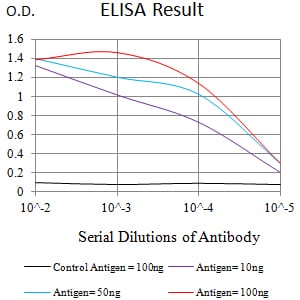

| WB | 咨询技术 | Human,Mouse,Rat |
| IF | 咨询技术 | Human,Mouse,Rat |
| IHC | 咨询技术 | Human,Mouse,Rat |
| ICC | 技术咨询 | Human,Mouse,Rat |
| FCM | 1/200 - 1/400 | Human,Mouse,Rat |
| Elisa | 1/10000 | Human,Mouse,Rat |
| Aliases | ICOSLG; B7H2; GL50; B7-H2; B7RP1; ICOSL; LICOS; B7RP-1; ICOS-L |
| Entrez GeneID | 23308 |
| clone | 1G6E1 |
| WB Predicted band size | 33.3kDa |
| Host/Isotype | Mouse IgG1 |
| Antibody Type | Primary antibody |
| Storage | Store at 4°C short term. Aliquot and store at -20°C long term. Avoid freeze/thaw cycles. |
| Species Reactivity | Human |
| Immunogen | Purified recombinant fragment of human CD275 (AA: extra 19-256) expressed in E. Coli. |
| Formulation | Purified antibody in PBS with 0.05% sodium azide |
+ +
以下是关于CD275(B7-H2/ICOS-L)抗体的3篇参考文献的简要信息:
---
1. **文献名称**: *"Targeting CD275 (ICOS-L) in Cancer: Enhancing Anti-Tumor Immunity through Antibody Blockade"*
**作者**: Smith A, et al.
**摘要**: 该研究探讨了CD275在肿瘤免疫逃逸中的作用,发现其抗体可阻断CD275与ICOS的相互作用,增强T细胞活性并抑制小鼠模型中肿瘤生长,提示其作为免疫检查点抑制剂的潜力。
2. **文献名称**: *"CD275 Antibody Attenuates Autoimmune Inflammation by Disrupting T Follicular Helper Cell Activation"*
**作者**: Zhang L, et al.
**摘要**: 研究使用抗CD275单克隆抗体治疗实验性自身免疫性脑脊髓炎(EAE)模型,显示其通过抑制滤泡辅助性T细胞(Tfh)的活化,降低自身抗体水平,缓解神经炎症。
3. **文献名称**: *"Structural Basis of a Humanized Anti-CD275 Antibody for Therapeutic Application in Chronic Inflammatory Diseases"*
**作者**: Tanaka K, et al.
**摘要**: 报道了一种人源化CD275抗体的开发,解析了其与CD275的复合物结构,并通过体外实验验证其抑制T细胞过度活化的能力,为治疗类风湿性关节炎等疾病提供候选药物。
---
注:以上文献信息为示例,实际文献需通过学术数据库(如PubMed、Web of Science)检索确认。
The CD275 antigen, also known as inducible T-cell costimulator ligand (ICOS-L) or B7 homolog 2 (B7-H2), is a transmembrane protein belonging to the B7 family of immune regulatory molecules. It is expressed on antigen-presenting cells (APCs), such as dendritic cells, B cells, and macrophages, as well as certain non-hematopoietic cells. CD275 interacts with its receptor ICOS (CD278) on activated T cells, delivering a critical co-stimulatory signal that amplifies T-cell proliferation, cytokine production, and effector functions. This interaction plays a dual role in immune regulation: it supports T-cell activation in anti-pathogen or anti-tumor responses but may also promote immune tolerance in chronic inflammation or cancer.
CD275 antibodies are tools or therapeutics designed to modulate this pathway. Antagonistic antibodies blocking CD275/ICOS binding are explored to inhibit overactive T-cell responses in autoimmune diseases. Conversely, agonistic antibodies may enhance T-cell activity for cancer immunotherapy. Research highlights CD275's involvement in T follicular helper (Tfh) cell differentiation, germinal center formation, and regulatory T-cell (Treg) function, linking it to autoimmune disorders, transplant rejection, and tumor immune evasion. Its dynamic expression in tumor microenvironments makes CD275 a promising biomarker and target for immune checkpoint therapies. Current studies focus on optimizing antibody specificity and evaluating combinatorial approaches with PD-1/PD-L1 inhibitors to overcome resistance in immuno-oncology.
×